
Learning how to ask for help is a crucial part of every business owner’s journey. You may have a burning desire to be self-sufficient and take pride in what you have accomplished so far. But you should balance those emotions with the ability to recognize when it’s time to reach out for help. You might need to draw on an expert’s knowledge to overcome a current challenge or capitalize on a new opportunity. When faced with a situation that requires a fresh perspective or advice on how to move forward, don’t be above asking for help.
Why You Should Ask for Help
Regardless of your success to date, remember that you are always learning. After all, nobody knows everything about starting a business. You might make the best pizza in town, but that doesn’t make you a proficient accountant who can effectively manage your restaurant’s finances. Or, on the other hand, you could be the best accountant in town, but that doesn’t make you a top-notch marketing strategist to advertise your accounting firm. So, it’s important to recognize when to ask for help in business, even if you feel very comfortable with your professional skills.
For example, a South Florida celebrity chef was working to build her promising sauce and marinade brand into a household name. When her business failed to take off on a large scale, she realized that she needed help. She reached out to Marcus, who consulted with her to understand why her unique sauces and marinades were not breaking through the clutter of the crowded condiment market.

Together, they discovered that many efficiencies needed to be implemented in the bottling process to scale production while decreasing costs and improving margins. Marcus also pointed out that the brand needed a facelift to be more competitive on the shelves against the many other sauces fighting for attention at the supermarket. Recognizing that these professional skills were not in their wheelhouse, they reached out to a leading full-service marketing and digital advertising agency in South Florida for a full-scale overhaul that included packaging redesign, a new website and data-driven strategies. The company was back in business with this “taste-full” rebrand, and the owner realized that asking for help allowed her to broaden her support network.
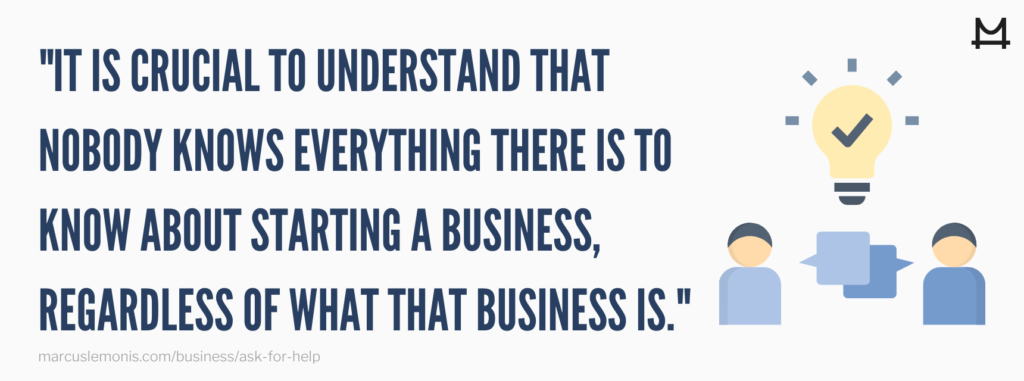
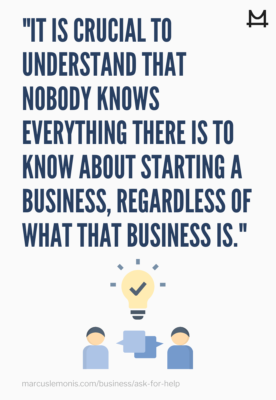
How to Know When You Should Ask for Help
Like many entrepreneurs, there might be a time when you realize that your business could use a hand. Maybe you have tried everything you thought you could do, and it is still not delivering the expected results. Or perhaps you’re just trying to “fake it until you make it,” but you realize that you’re faking more than you should, and you’re still far from making it.
When you can accept that everyone sometimes needs help, you will be capable of recognizing your specific business needs and limitations openly. This acknowledgment will let you take the next, most essential move—reaching out to a subject matter expert, or maybe even a friend or family member, to assist you in areas where you recognize that you can’t do it on your own.
Now that you know that it is okay not to know it all in business, and that sooner or later you will need support from others around you, let’s go over some pointers on how to ask for help in business.
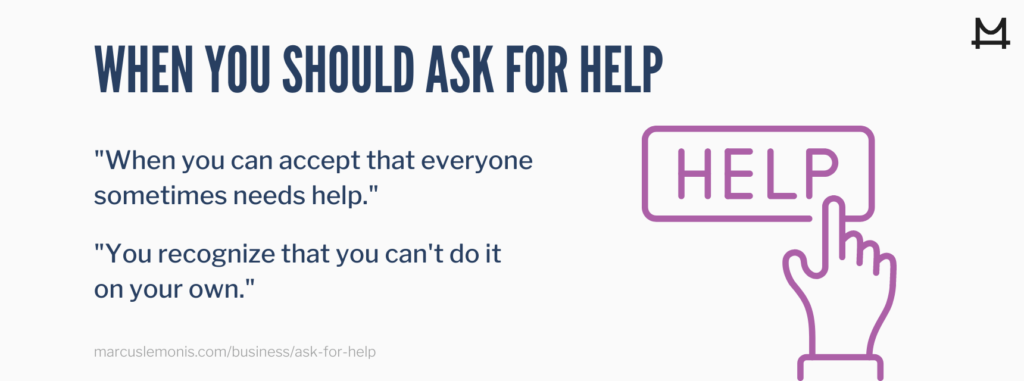
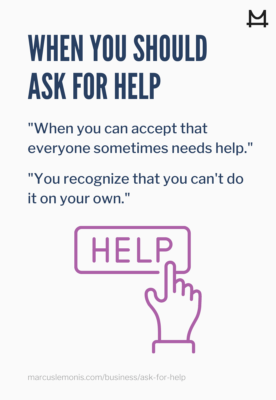
Ask a Friend or Family Member or Hire a Professional
As an owner, you might have every available dollar tied to the business with no budget to hire a professional. Although not ideal, you could ask a friend or family member to help out for free. But be aware that mixing friendships, family and business can sometimes lead to very delicate and often uncomfortable situations. After all, there’s a big difference between asking a hired painter to repaint a wall that looks a little sloppy and asking your father-in-law to redo his work… for free. In that hypothetical situation, you’ll probably smile, pretend to be grateful, and end up repainting the wall yourself.
What happens when a neighbor, trying to help out by installing a piece of equipment, breaks it? You can’t charge him for an honest mistake. But you still need to figure out how to fix the equipment before you can open your shop. Sometimes in a family business, a big order or critical issue means all hands on deck and everyone chips in to make the things happen. But know that there’s always going to be some risk associated with this.
If you can afford a professional, especially when it’s a delicate situation or a costly issue, try to hire an experienced specialist. You should also tread carefully with your finances and legal requirements. Do not rely on a buddy to help you figure out contracts, set up your accounting system, file for government licenses or permits, or deal with your business’ taxes. If you are going to ask for help, make sure it is a person with the know-how and experience in the area you need help. That might be your best friend who happens to be a CPA, but not your nephew who learned what EBITDA means by watching a three-minute YouTube video.
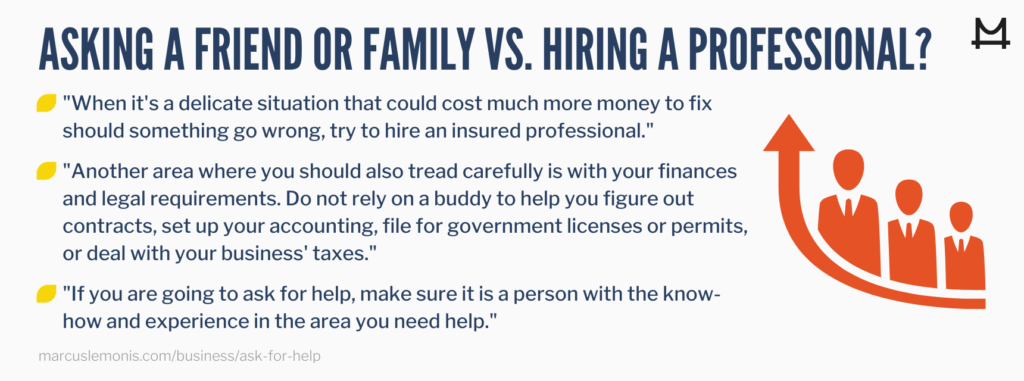
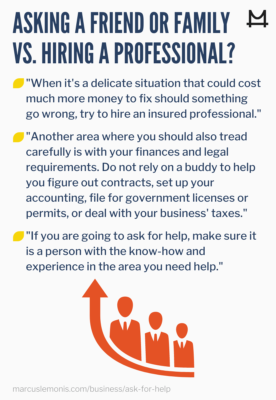
Tips on How to Ask for Help in Business
1. Know What You Need
Try to identify the problem or opportunity before asking for help. That helps you determine the right person to provide assistance. If your customer relationship management (CRM) application needs updating, find an IT specialist. Don’t ask your lawyer for help!

2. Be Clear About What You Want
Once you have identified the issue and the correct person to help, you need to be clear with what results you want. Going back to our South Florida sauce company, the owner knew she wanted to scale her business, so she reached out to a consultant – in this case Marcus – who has a wealth of experience in scaling businesses. She learned that while it may not always be easy to pinpoint your problem, it’s essential to be clear about what you’re trying to accomplish.
3. Do Your Research and Personalize Your Request
Before you reach out to a professional, friend or family member for help, do your research so you understand the potential cost and timeline to achieve results. Then, make sure to personalize your request rather than sending a generic email, text or voice message. When contacting professionals, make sure they feel like you are reaching out to them specifically for their particular skill set. A personalized email, that lets the person know that you did your research, is going to go a much longer way than a generic cry for help.
4. Offer Something in Return
We have all heard it before: “You scratch my back, and I’ll scratch yours.” Well, this applies to business as well. While you will probably need to pay for services rendered, you might be able to work out a creative solution to reduce that outlay. Maybe it’s a barter arrangement where you offer your services to help them out after they help you. If it’s a “bet the company” issue, you could offer a share of equity in the business in return for assistance. On the other hand, it could be something as simple as a lifetime friend and family discount at your shop, or a basket of cookies. Regardless of what it may be, it is imperative to offer something in return – even if it’s just a simple thank you.

5. Make it Easy for People to Help You
You shouldn’t expect people to bend over backwards to help you out. When it comes to how to ask for help in business, make sure you accommodate the other person’s schedule, make yourself accessible, and have everything they need to complete the task at hand. Also, be realistic about the project timeline. Most things take longer than expected!
6. Be Grateful
This goes back to grade school. When someone helps you, say thank you. After all, they just did something for your business that you could not do. Now, your business is in a better place. People will always be more eager to help those who show gratitude, and expressing your appreciation can go a long way toward building long-lasting relationships. This applies to your staff, clients, consultants, vendors and anyone else you work with. You never know when you might need their services again, so don’t burn any bridges. Plus, it is just a nice thing to do.
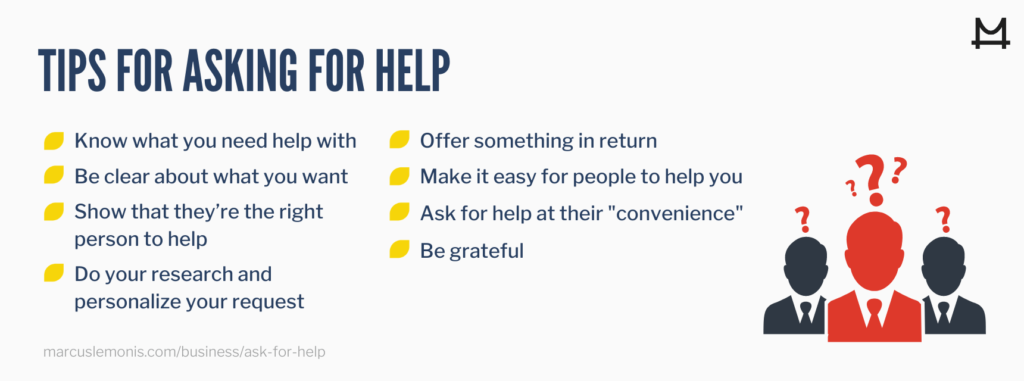
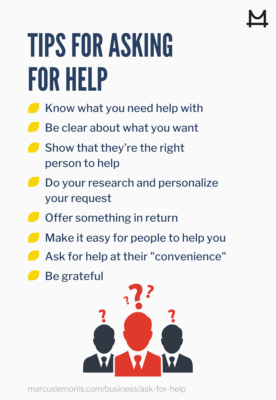
Remember even a capable and resourceful entrepreneur sometimes needs help to achieve the goals you have set for yourself and your business. This means recognizing when you need help, building a robust support network, and having the courage to reach out when needed. As Marcus always says, “The key to business isn’t being smarter or wealthier, it’s being able to connect to people and relate to them.”
- Are there any things in your business you can use help with?
- How can you go about asking for help in the right way?





